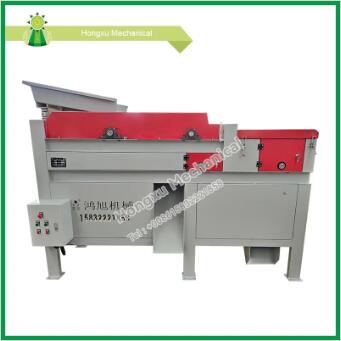Maximizing Efficiency with Stainless Steel Metal Sorting Machines: A Guide for Businesses
2024-09-10
In industries like recycling, manufacturing, and waste management, operational efficiency is everything. One of the most crucial tools for maintaining this efficiency is the stainless steel metal sorting machine. Designed to handle large volumes of mixed metals, these machines offer businesses a cost-effective way to sort materials, improve productivity, and reduce waste. In this blog, we’ll dive into how companies can benefit from using these machines and offer some tips on maximizing their performance.
1. The Role of Stainless Steel Metal Sorting Machines in Industrial Operations
For industries dealing with metal, sorting plays a critical role in daily operations. Whether it’s a recycling plant looking to process scrap metal or a manufacturing facility needing to ensure material purity, stainless steel metal sorting machines streamline the sorting process and boost efficiency.
- Automated Sorting: Unlike manual sorting, which can be slow and prone to error, these machines use automated systems to sort different metals based on their properties.
- High Processing Speed: These machines are capable of processing tons of metal per hour, drastically reducing sorting times and improving throughput for businesses.
2. Why Stainless Steel?
One of the reasons stainless steel is used for these sorting machines is its resistance to corrosion. Given the high volume of material handled, durability is a key factor, and stainless steel offers the strength needed for industrial environments.
- Corrosion-Resistant: Stainless steel machines are less likely to rust, even when exposed to wet or harsh environments, making them long-lasting and reliable.
- Easy Maintenance: Stainless steel is easy to clean and maintain, which reduces downtime and keeps operations running smoothly.
3. Key Features of Modern Stainless Steel Metal Sorting Machines
To meet the demands of various industries, modern stainless steel metal sorting machines come equipped with several advanced features:
- High-Precision Sorting: Equipped with technologies like magnetic separators, eddy currents, and optical sensors, these machines can differentiate between various types of metals with high precision.
- Customizable Settings: Businesses can often adjust the settings to sort specific metals, such as aluminum, copper, and stainless steel, depending on their needs.
- Automated Control Systems: Many machines feature automated control panels that allow operators to monitor the sorting process in real-time and make adjustments as needed.
4. Boosting Productivity and Reducing Costs
By automating the sorting process, businesses can significantly boost productivity while reducing labor costs. With a stainless steel metal sorting machine, companies can reduce the need for manual labor, lower the risk of human error, and complete sorting tasks in a fraction of the time.
- Increased Throughput: Faster sorting times mean more material can be processed in a shorter amount of time, increasing overall productivity.
- Labor Cost Savings: Since these machines operate automatically, businesses can reduce the number of employees required to manually sort materials, leading to significant cost savings.
- Minimized Error: Automated sorting reduces the risk of contamination or mixing of metals, ensuring that sorted materials are of the highest quality.
5. Applications Across Multiple Industries
Stainless steel metal sorting machines are versatile and find applications across a variety of industries:
- Recycling Plants: In the recycling industry, sorting machines help classify and separate metals from scrap materials, which can then be sold or reused.
- Metal Processing: Metal processing facilities use sorting machines to ensure that materials entering production are pure and free from contamination.
- Manufacturing: Manufacturers in industries like automotive and electronics rely on sorting machines to ensure that the materials used in their products meet high standards of quality.
6. Maximizing Performance: Tips for Businesses
While stainless steel metal sorting machines are designed for efficiency, there are several ways businesses can further maximize their performance:
- Regular Maintenance: Keeping the machine clean and performing routine maintenance checks ensures that it operates smoothly and extends its lifespan.
- Calibrate the Machine: Depending on the types of metals being sorted, businesses should calibrate the machine regularly to ensure optimal sorting accuracy.
- Train Operators: Ensuring that operators are properly trained on how to use the machine and its features will help maximize productivity and reduce errors.
- Invest in Upgrades: As new technologies become available, investing in software or hardware upgrades can improve sorting speed and accuracy, keeping your machine at the cutting edge of technology.
7. Sustainability and Environmental Impact
In addition to improving operational efficiency, stainless steel metal sorting machines play a crucial role in promoting sustainability. By enabling more effective metal recycling, they help reduce the need for mining new raw materials, which in turn lowers the carbon footprint of industries.
- Less Waste: Efficient sorting ensures that more material can be reused, reducing the amount of waste sent to landfills.
- Energy Savings: By recycling metals, businesses save the energy required to produce new materials from scratch, which is a much more energy-intensive process.
Conclusion
For businesses looking to improve efficiency, reduce costs, and promote sustainability, stainless steel metal sorting machines offer an ideal solution. By automating the sorting process and providing high levels of accuracy, these machines help businesses increase productivity while ensuring that the materials they process are of the highest quality. With proper maintenance and operator training, businesses can further enhance the performance of these machines and achieve even greater operational efficiency.



